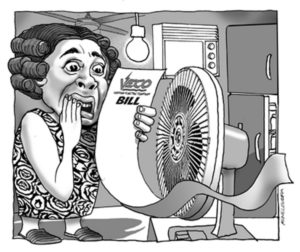
Historical data from the Visayan Electric Company (Veco) shows that the consumption of electricity goes up towards the summer season and into the summer months largely due to a combination of two factors: the searing heat and the school break which translate to the use of more appliances by people who are on vacation at home.
“While using electric fans and air conditioners have become a necessity, there are still ways in which Veco customers can save on electricity and avoid high electric bills,” said Quennie Sanchez-Bronce, Veco’s reputation enhancement manager.
When using air conditioners, she said, it is important to make sure to use the right kind of air con for the room size.
For example, an air conditioner with low horsepower used in a big room will have to work double time in order to cool the room.
Setting the thermostat to an ideal level is also important; as well as using the aircon timer, said Bronce.
Bronce explained that the lesser the difference between the outdoor and indoor temperatures, the lower the energy consumption of the air conditioner.
For electric fans, these should be properly maintained and cleaned.
“Place the electric fan near a door or window for proper air circulation and to improve the fan’s cooling effect,” she suggested.
Lights that are not needed should also be turned off.
As a general rule, Bronce said, all appliances which are not in use should be unplugged; as plugged, yet unused appliances, are considered “phantom load” which is a total waste of energy.
The phantom load also contributes to the electric bill.
Based on data from Veco, the actual peak demand in March last year was at 458 megawatts (MW).
This rose to 492 MW in April 2017 and 489 MW in May 2017.
The surge during the summer months was considered significant as the actual peak demand from January to February 2017 was only between 445 MW to 450 MW.
“For the same period (March, April, May) this year, the forecasted peak demand is 4.5% to 6.5% higher or 20 to 25 MW more for the entire three months,” Bronce said.
Veco is projecting a higher power demand in the summer months of 2018 because of the hotter temperatures and new customer connections this year.
Meanwhile, Veco cautions against flying kites near power lines which is commonly done by children during summer.
Veco warns that the hazardous practice may cause electrocution and power outages if the kites get caught in the overhead wires.
“Kite flying should only be done in open areas, away from overhead power lines, substations, and other electrical installations,” said Bronce.
Cebu City Ordinance 1471 prohibits kite flying near power lines, telecommunication lines, and other similar facilities.
According to the ordinance, kites can only be flown in areas that are at least 3,000 square meters wide which is equivalent to six basketball courts.
In case kites do get tangled up in overhead power lines, Veco recommends to immediately release the string and not attempt to pull it out or climb the pole to retrieve the kite.
For those who happen to see kites caught in power lines, Bronce suggests to call the Veco hotline at (032) 230-8326 or send a message to Veco’s Facebook page so that a technical crew can be immediately sent to the area.
Disclaimer: The comments uploaded on this site do not necessarily represent or reflect the views of management and owner of Cebudailynews. We reserve the right to exclude comments that we deem to be inconsistent with our editorial standards.
